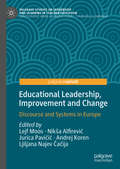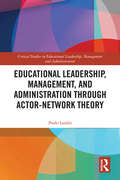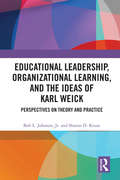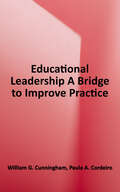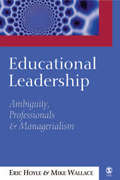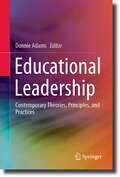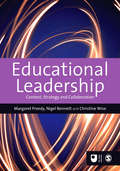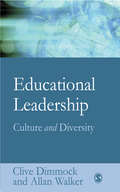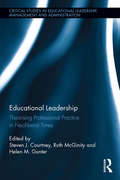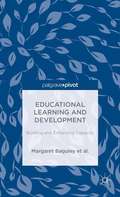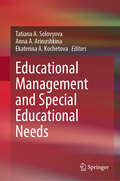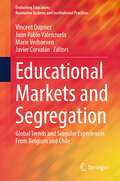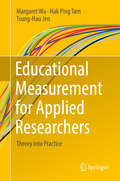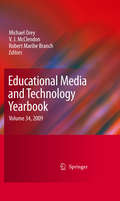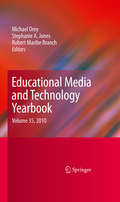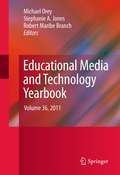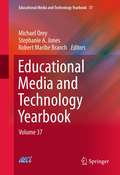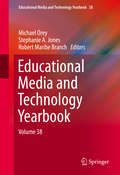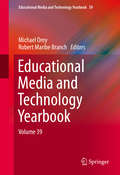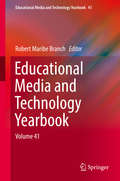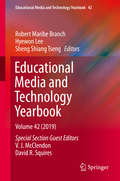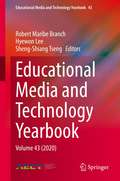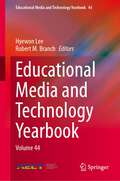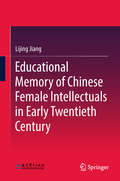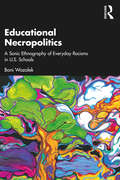- Table View
- List View
Educational Leadership, Improvement and Change: Discourse and Systems in Europe (Palgrave Studies on Leadership and Learning in Teacher Education)
by Nikša Alfirević Jurica Pavičić Lejf Moos Andrej Koren Ljiljana Najev ČačijaThis book analyses selected critical concepts of policy and practice in educational leadership in five European countries. The editors and contributors cover Croatia, Slovenia, Lithuania, Denmark and Norway, spanning a wide geographical region as well as diverse historical and political contexts. The analyses primarily consider the issues of convergence and divergence in local educational leadership policies and practice that are developing and emerging from traditional structures and discourses under global, trans-national and regional influences. Focusing on both the macro and micro levels, this book examines a range of topics including international benchmarking, inclusive education practices and digital transformation. It will be of interest and value to scholars of educational leadership in Europe, particularly within smaller countries.“Today’s local educational leadership policies and practice are connected with the historical roots of five small European countries. In the analysis, perspectives from within each country and comparisons are used interestingly. Both levels of analysis bring out new understandings of the relationship between policy and practice and how they have been related to leadership in a historical discourse. In my opinion the different country chapters and the comparisons represent important new knowledge and I recommended the book as reading for school leaders and policy makers in the field of educational leadership.” —Professor Olof Johansson, Umeå University, Sweden “The book fills a gap in the research of cross-national research, comparing school leadership issues in two Balkan countries, Croatia and Slovenia, one Baltic country, Lithuania, and two Scandinavian countries, Norway and Denmark. To my knowledge it is the first time there has been this sort of cross-investigation of commonalities and differences in school leadership conditions between these countries in the age of globalization. I am sure that many scholars and practitioners can benefit from this book and hereby recommend it. “ —Associate Professor Emeritus Klaus Kasper Kofod, Aarhus University, Denmark
Educational Leadership, Management, and Administration through Actor-Network Theory (Critical Studies in Educational Leadership, Management and Administration)
by Paolo LandriEducational Leadership, Management, and Administration through Actor-Network Theory presents how actor-network theory (ANT) and the related vocabularies have much to offer to a critical re-imagination of the dynamics of management in education and educational leadership. It extends the growing contemporary perspective of ANT into the study of educational administration and management. This book draws on case studies focusing on new configurations of educational management and leadership. It presents new developments of ANT ("After ANT" and "Near ANT") and clarifies how these "sensibilities" can contribute to thinking critically and intervening in the current dynamics of education. The book proposes that ANT can offer an ecological understanding of educational leadership which is helpful in abandoning the narrow humanistic world of managerialism, considering a post-anthropocentric scenario where it is necessary to compose together new "liveable" assemblages of humans and nonhumans. This book will be of great interest to academics, scholars and post-graduate students in the fields of educational management, leadership and administration, as well as education policy. It will also be highly relevant to policy makers and experts of education policy at the national, European and international levels.
Educational Leadership, Organizational Learning, and the Ideas of Karl Weick: Perspectives on Theory and Practice
by Sharon D. Kruse Bob L. Johnson Jr.Grounded in the theory of sociologist Karl Weick, this edited volume explores key concepts of educational leadership and organizational learning. Chapter authors analyze and reflect on the implications of Weick’s thinking on leadership preparation and development. Providing a thorough understanding of the influence of his ideas in education, this volume unpacks the ways in which Weick’s ideas influence and shape organizational learning and educational leadership and policy today.
Educational Leadership: A Bridge to Improved Practice
by Paula A. Cordeiro William G. CunninghamThis book describes how successful and effective schools and administrators operate in an increasingly challenging, fast-paced, demanding, and at times revolutionary environment. Readers are offered an integrated view of the knowledge base, research, and practice of administration within a context of multiple perspectives and a wide range of thinking. This edition provides a comprehensive discussion of the field of educational administration in three sections. The Foundations of Educational Leadership presents a context for educational leadership studies with thorough descriptions and applications of educational standards, common practices, and assessments that equip each learner with a solid understanding of his or her own leadership style. Instructional Leadership and Student Learning emphasizes the critical role of the school leader in education, and to the student and the teacher. Operational Support for Effective Teaching and Learning examines the major functions of the school leader, including legal, financial, and stewardship responsibilities. -FEATURES OF THIS EDITION INCLUDE: - A Problem-Based Learning Project at the end of each section, offering opportunities for applied practice and further understanding -New Chapter, Technology and Learning, studies the growth of technologies in schools and what that means for aspiring school leaders.- All new Expert Opinions from influential and award-winning educational scholars, including Kathleen Binkowski, Chris Devers, and Ian Martin.
Educational Leadership: Ambiguity, Professionals and Managerialism
by Mike Wallace Eric HoyleHoyle and Wallace illustrate with penetrating insight the perverse outcome of tightening management and leadership so much that it leads to three different forms, each with the same five characteristics, of what they call "managerialism": excessive micromanagement of schools in a sometimes futile and self-defeating quest for success′ - Tim Brighouse, Times Educational Supplement `This book is an excellent read about management and leadership in schools. Overall, I felt that this book makes a positive contribution to the debate about the impact of managerialism within public services. I liked the elements that made up the ironic orientation (scepticism, pragmatism and contingency), recognising them in my own experiences in Higher Education, and I liked the way in which the concept of irony was linked to some key concerns as well as positive practices. This is a book that I would thoroughly recommend to anyone interested in leadership and management in schools, but given its broader application, I would also recommend the book to anyone interested in leadership and management in the public sector′ - ESCalate Read the full review as posted on the ESCalate website, the Education Subject Centre for the Higher Education Academy ′Eric Hoyle and Mike Wallace are two of the best known writers on educational leadership and management. They have made very significant contributions to organisational theory and its application to education for four decades. This book′s focus on ambiguity and irony provides a welcome and timely contrast to the rational assumptions and managerialism which underpin government policy and much academic writing in this field′ - Professor Tony Bush, International Educational Leadership Centre, University of Lincoln ′They have brought to centre-stage ideas and concepts which have largely been peripheral in the field, and in doing so have made us look with new lenses at what we need to say about professional work and identity. It has therefore performed a valuable and much needed service, and will provide a major reference point in debates about the future of the education profession′ - Mike Bottery, Educational Management, Administration & Leadership ′This in an important book. I wish I had written it, indeed I wish I had the skill, the knowledge and the wit to write it′ - Mark Brundrett, Educational Management, Administration & Leadership Why do efforts to improve the quality of education via organizational leadership and management make matters worse in some respects as well as better? In what ways are education professionals responding to such efforts? The authors of this highly original book develop an ironic perspective for analysing the ambiguities and unintended consequences of well-intentioned actions in organizational life, and how these are exacerbated by change. Focusing on school leadership and management, Hoyle and Wallace suggest that major reforms have had limited success because the changes introduced have diverted school staff from their core task of promoting student learning, resulting in dissatisfaction, frustration and stress. They argue that a more temperate approach to leadership and management supported by wise policy-making can create structures that take the strain and reduce stress, encourage autonomy while accepting associated risks, and sponsor moderate experimentation and innovation emerging from communities of professional practice. Educational Leadership and Organizational Irony is essential reading for all concerned with improving education: advanced course students, leaders and managers, trainers, administrators, policy-makers and academics. It also offers insights for the study of public service and business organizations.
Educational Leadership: Contemporary Theories, Principles, and Practices
by Donnie AdamsThis book provides a rigorous grounding in contemporary educational leadership theories and their application to policy and practice globally across educational contexts. The book showcases contributions from authors with a deeply embedded understanding of educational leadership and in schools’ context. It will focus on major aspects of school leadership, including contemporary theories and models in the 21st century, the role of the principal, the work of senior and middle leaders, leadership, and student outcomes. Each chapter will engage with theory, policy, and practice, and draw on authors’ own research and with other empirical and conceptual sources.
Educational Leadership: Context, Strategy and Collaboration (Published in association with The Open University)
by Christine Wise Nigel Bennett Margaret PreedyDrawing together current thinking and research by leading writers in the field, this Reader will help you to understand and critically analyse key strategic aspects of educational leadership, including: - leadership perspectives and values - external and internal contexts - autonomy and accountability - partnership and collaboration - leading strategy and change. The book explores major challenges for educational leaders in managing the increasingly permeable boundary between educational organisations and their external contexts and reconciling environmental expectations and internal priorities. The Reader will encourage you to positively problematize the field and reflect on current debates and issues. This book will be an essential resource for providers and students of postgraduate level courses in educational leadership and management, as well as those involved in undertaking professional development programmes. It will also serve the reflective practitioner as personal reference when occupying or aspiring towards leadership roles in schools, colleges and other educational organisations. Dr Maggie Preedy, Professor Nigel Bennett and Dr Christine Wise have taught, researched and published widely in the field of educational leadership and management. Maggie Preedy and Christine Wise are Senior Lecturers in the Faculty of Education and Language Studies at The Open University, UK. Nigel Bennett is Emeritus Professor of Leadership and Management in Education at The Open University.
Educational Leadership: Culture and Diversity
by Clive Dimmock Allan David Walker`A highly recommendable and powerful work...I have found this book to be both a revelatory mirror on past events and an inviting window to future prospects. I am certain that it will be of equal or greater value to all those involved and interested in the tangled complexities, and inherent rewards, of educational leadership, particularly within international or cross-cultural contexts' - Daniel H. Jarvis, International Review of Education `Clive Dimmock and Allan Walker's books is a valuable addition to the overcrowded literature on leadership. This is a useful and important book because citizenship, globalization and the tensions with nationality should be the concern of all who lead any school; even monofaith, monoethic and monolingual schools' - Tim Brighouse, TES Friday 'The authors offer a rigorous and systematic analysis based on careful definition, illustration and discussion which demonstrates the importance of understanding culture, leadership and their interaction in different contexts: in doing so they provide a powerful antidote to the simplistic export of ideas and lay foundations for a more sophisticated conceptual framework for the study of educational leadership' - John West-Burnham, International Leadership Centre, University of Hull This key text in educational leadership focuses on the significance of the context and culture of schools. The book addresses the growing recognition of cultural differences between societies and the resultant differences in schooling. It also deals with vital issues relating to multicultural education and the leadership of multicultural schools. Drawing on their first-hand experience, the authors explore the differences evident in classroom teaching and learning, as well as organizational, leadership and management aspects of schools. They show how such differences can make over-reliance on Anglo-American approaches misleading, ineffective and restrictive. Key features of the book include: - a methodology to support the emerging field of international and comparative educational leadership and management - in-depth comparative analysis of Anglo-American and Asian schooling and educational management - the leadership of multi-cultural schools This book is essential reading for professionals and students of educational leadership and management, as well as administrators.
Educational Leadership: Theorising Professional Practice in Neoliberal Times (Critical Studies in Educational Leadership, Management and Administration)
by Helen Gunter Steven J Courtney Ruth McGinityEducational Leadership brings together innovative perspectives on the crucial role of theory and theorising in educational leadership at a time when the multiple pressures of marketisation, competition and system fragmentation dominate the educational landscape. This original and highly thought-provoking edited collection is a much-needed counterbalance to the anti-theoretical trends that have underpinned recent education reforms. Contributors employ a range of theories in original and innovate ways in order to reveal the lived experiences of what it means to be an educational leader at a time of rapid modernisation, where the conceptual terrain of ‘modern’ has been appropriated by corporate and private interests, where notions of ‘public’ are not only hidden, but also derided, and where school leaders must meet the conflicting demands of competing accountabilities. Drawing on research projects conducted in the UK, Educational Leadership presents convincing evidence that the need to consider theory crosses national borders, and the authors discuss changes to professional identities and practices that researchers around the world will recognise. This detailed and insightful work will appeal to academics, researchers and postgraduate students in the fields of education and sociology, as well as those with an interest in organisational and political theory. The topical subject matter also makes the book of relevance to practitioners and policy-makers in education and the public services more generally.
Educational Learning and Development: Building and Enhancing Capacity
by Andy Davies Margaret Baguley Patrick Alan Danaher Linda De George-Walker Janice K. Jones Karl J. Matthews Warren Midgley Catherine H. ArdenThrough ten research projects, this book explores the topic of educational learning and development in order to examine issues that are impacting, either positively or negatively, on current research in this area. The authors explore the capacity building potential of the projects and what factors impacted on or assisted their development.
Educational Management and Special Educational Needs
by Anna A. Arinushkina Tatiana A. Solovyova Ekaterina A. KochetovaThis book systematizes the latest findings on the clinical, psychological, and pedagogical features of today’s children with special educational needs (SEN) and expands the scientific understanding that characterizes such children. The book develops a system of education and assistance for children with SEN, including children with locomotor disabilities, intellectual disabilities, autism spectrum disorders, and hearing and visual impairments. The book is intended for heads of educational authorities, parents, specialists working with children with special educational needs, psychologists, teachers, methodologists, specialists in the field of inclusive education, and students and teachers in special education of pedagogical and psychological departments of higher education institutions.
Educational Markets and Segregation: Global Trends and Singular Experiences From Belgium and Chile (Evaluating Education: Normative Systems and Institutional Practices)
by Vincent Dupriez Juan Pablo Valenzuela Marie Verhoeven Javier CorvalánThis edited volume highlights the deep issues of the educational markets and school segregation from its origins to its effects. The book discusses both global trends as well as focalized examples. It’s based on a comprehensive review of existing literature and an in-depth analysis of two educational systems: The French-speaking community in Belgium and Chile. Both contexts are characterized by a high degree of segregation, a structural environment of free choice of schools and competition between public and private schools financed with public resources. This book provides an up-to-date synthesis of scientific knowledge on the issue of segregation and rigorous analyses of recent policies aimed at reducing segregation in educational systems. It highlights the complexity of a process of change, the importance of its legitimacy among the population and the need of identifying the ethical and social justice issues surrounding school segregation. By providing a solid theoretical and empirical synthesis, this book is a great resource to students, researchers and academics in education, as well as social scientists and policy-makers.
Educational Measurement for Applied Researchers
by Margaret Wu Hak Ping Tam Tsung-Hau JenThis book is a valuable read for a diverse group of researchers and practitioners who analyze assessment data and construct test instruments. It focuses on the use of classical test theory (CTT) and item response theory (IRT), which are often required in the fields of psychology (e. g. for measuring psychological traits), health (e. g. for measuring the severity of disorders), and education (e. g. for measuring student performance), and makes these analytical tools accessible to a broader audience. Having taught assessment subjects to students from diverse backgrounds for a number of years, the three authors have a wealth of experience in presenting educational measurement topics, in-depth concepts and applications in an accessible format. As such, the book addresses the needs of readers who use CTT and IRT in their work but do not necessarily have an extensive mathematical background. The book also sheds light on common misconceptions in applying measurement models, and presents an integrated approach to different measurement methods, such as contrasting CTT with IRT and multidimensional IRT models with unidimensional IRT models. Wherever possible, comparisons between models are explicitly made. In addition, the book discusses concepts for test equating and differential item functioning, as well as Bayesian IRT models and plausible values using simple examples. This book can serve as a textbook for introductory courses on educational measurement, as supplementary reading for advanced courses, or as a valuable reference guide for researchers interested in analyzing student assessment data.
Educational Media and Technology Yearbook, Volume 34
by Robert Maribe Branch V. J. Mcclendon Michael OreyThe Educational Media and Technology Yearbook is dedicated to theoretical, empirical and practical approaches to educational media development. All chapters are invited and selected based on a variety of strategies to determine current trends and issues in the field. The 2009 edition will highlight innovative Trends and Issues in Learning Design and Technology, Trends and Issues in Information and Library Science, and features a section that lists and describes Media Related Organizations and Associations in North America. <P><P> The Educational Media and Technology Yearbook, a scholarly resource for a highly specialized professional community, is an official publication of the AECT and has been published annually for 33 years.
Educational Media and Technology Yearbook, Volume 35
by Robert Maribe Branch Michael Orey Stephanie A. JonesThe evolution of educational technology has seen a shift from hardware and software to tactics and techniques, as the 2010 edition of the Educational Media and Technology Yearbook makes abundantly clear. As in previous years, it offers the reader a snapshot of the moment and a look ahead to issues most likely to shape the immediate future--an array as varied as the use of social networking sites in learning, new collaborations between media specialists and non-teaching school personnel, and the emerging discipline of Human Performance Technology. Here are ideas that are not only intellectually intriguing but also practical and practice-building, inspiring educators using computer technology to move beyond traditional teaching roles toward learning design. Included in the 2010 Yearbook: Salient issues in learning, design, and technology, such as the critical part school leadership plays in instructors' acceptance or rejection of technology, New trends in library and information science, including the role of school library media centers in preventing cyberbullying, This year's leadership profiles: Jerrold Kemp, author of Designing Effective Instruction; W. Michael Reed, accomplished, dedicated, and recognized educator in instructional technology, A worldwide directory of current professional associations and organizations in learning design, technology, information, and library science, Up-to-date listings of graduate program in these fields, rated using a variety of criteria, Special mediagraphy section featuring journals, ERIC documents, and media-related publications in specialized areas, including distance education, simulation/virtual reality, artificial intelligence, special education, and professional development. Academics in learning design and technology, and information and library science will welcome the latest edition of the Educational Media and Technology Yearbook as a reference, idea book, and a panoramic study of where we are now.
Educational Media and Technology Yearbook, Volume 36
by Robert Maribe Branch Michael Orey Stephanie A. JonesThe Educational Media and Technology Yearbook is dedicated to theoretical, empirical and practical approaches to educational media development. All chapters are invited and selected based on a variety of strategies to determine current trends and issues in the field. The 2011 edition will highlight innovative Trends and Issues in Learning Design and Technology, Trends and Issues in Information and Library Science, and features a sections that list and describe Media Related Organizations and Associations in North America, departments in the allied fields, and a listing of journals in the field.<P><P> The Educational Media and Technology Yearbook, a scholarly resource for a highly specialized professional community, is an official publication of the AECT and has been published annually for 35 years.
Educational Media and Technology Yearbook, Volume 37
by Robert Maribe Branch Michael Orey Stephanie A. Jones As digital devices play a more critical role in daily life than ever, more opportunities arise for innovative learning technologies—a trend on full display in the Educational Media and Technology Yearbook for 2012. This latest edition, volume 37, from the Association for Education, Communication, and Technology (AECT) notes the most current trends in the field of learning design and technology, taking into account the implications for both formal and informal learning. The majority of articles train their focus on graduate and professional goals, including an analysis of doctoral programs in educational technology and new collaborative learning platforms. Library science is a featured component of this analysis and Library Science programs are featured prominently in this analysis. Mediagraphy and profiles of leaders in the field are also included.
Educational Media and Technology Yearbook, Volume 38
by Robert Maribe Branch Michael Orey Stephanie A. JonesThe latest edition of the Educational Media and Technology Yearbook, from the Association for Education, Communication and Technology (AECT), notes the most current trends in the field of learning design and technology, taking into account the implications for both formal and informal learning. Pivotal research and discussion surrounding educational trends, leadership, organizations and programs have all been updated from volume 37. Chapters train their focus on graduate and professional goals, including an analysis of doctoral programs in educational technology and new collaborative learning platforms. Library science is a featured component of this analysis and Library Science programs are featured prominently in this analysis. This edition also features new content on mediagraphy.
Educational Media and Technology Yearbook, Volume 39
by Robert Maribe Branch Michael OreyThis book is an annual publication entering its 40th year. The series represents current trend and issues in the field of educational communications and technology, journals and other periodicals associated with the field, and the academic programs that prepare instructional technology professionals. Springer has been the publisher for the series, in cooperation with the Association for Educational Communications and Technology, for the past four years. Volume 39 will feature a section on Information Studies, in addition to updated information about programs and a new ranking of the top academic degree programs in the field of Learning, Design, and Technology.
Educational Media and Technology Yearbook: Volume 37 (Educational Media And Technology Yearbook Ser. #39)
by Robert Maribe BranchThe Educational Media and Technology Yearbook has become a standard reference in many libraries and professional collections. It provides a valuable historical record of current ideas and developments in the field. Part One of this updated volume, “Trends and Issues in Learning, Design, and Technology,” presents an array of chapters that develop some of the current themes listed above, in addition to others. In Part Two, “Leadership Profiles,” authors provide biographical sketches of the careers of instructional technology leaders. Part Three, “Organizations and Associations in North America,” and Part Four, “Graduate Programs,” are, respectively, directories of instructional technology-related organizations and institutions of higher learning offering degrees in related fields. Finally, Part Five, the “Mediagraphy,” presents an annotated listing of selected current publications related to the field.
Educational Media and Technology Yearbook: Volume 42 (Educational Media and Technology Yearbook #42)
by Robert Maribe Branch Hyewon Lee Sheng Shiang TsengThis is Volume 42 of the Educational Media and Technology Yearbook. For the past 40 years, our Yearbook has contributed to the field of Educational Technology in presenting contemporary topics, ideas, and developments regarding diverse technology tools for educational purposes. Our Yearbook has inspired researchers, practitioners, and teachers to consider how to develop technological designs and develop curricula and instruction integrating technology to enhance student learning, teach diverse populations across levels with effective technology integration, and apply technology in interactive ways to motivate students to engage in course content. In addition, Volume 42 features the Virtual Reality (VR) and Augmented Reality (AR) research and educational use cases, organized and coordinated by Vivienne and David. This section provides evidence that the affordances of AR, VR, and mixed reality, defined as an immersive multi-platform experience reality (XR), have begun to make indelible changes in teaching and learning in the United States. XR’s recent developments stimulated the editors to propose a special edition to mark the interoperability of immersive technology to push the boundaries of human curiosity, creativity, and problem solving. After years of incremental development, XR has reached a critical level of investment, infrastructure, and emerging production. The chapters included in this section illustrate how XR can push user inquiry, engagement, learning, and interactivity to new levels within physical and digital contexts.
Educational Media and Technology Yearbook: Volume 43 (2020) (Educational Media and Technology Yearbook #43)
by Robert Maribe Branch Hyewon Lee Sheng-Shiang TsengThis book is Volume 43 of the Educational Media and Technology Yearbook. For the past 40 years, our Yearbook has contributed to the field of Educational Technology by presenting contemporary topics, ideas, and developments regarding diverse technology tools for education. The Yearbook has inspired researchers, practitioners, and teachers to consider how to develop technological designs, curricula, and instruction.The audience for the Yearbook typically consists of media and technology professionals in K-12 schools, higher education, and business contexts. The Yearbook editors have dedicated themselves to providing a record of contemporary trends related to educational communications and technology and strive to highlight special movements that have clearly influenced the educational technology field. This volume continues the tradition of offering topics of interest to professionals practicing in other areas of educational media and technology.Includes research on emerging and contemporary topics in the field of educational technology;Provides an ongoing report on the current issues in the field of educational technology;Contains a section presenting organizations dedicated to educational technology;Includes a section presenting graduate programs in the field of educational technology;Includes a section presenting mediagraphy in the field of educational technology.
Educational Media and Technology Yearbook: Volume 44 (Educational Media and Technology Yearbook #44)
by Hyewon Lee Robert M. BranchThis is Volume 44 of the Educational Media and Technology Yearbook. For the past 40 years, our Yearbook has contributed to the field of Educational Technology in presenting contemporary topics, ideas, and developments regarding diverse technology tools for educational purposes. The Yearbook has inspired researchers, practitioners, and teachers to consider how to develop technological designs, curricula, and instruction, integrate technology to enhance student learning, teach diverse populations across levels with effective technological integration, and apply technology in interactive ways to motivate students to engage in course content.The audience for the Yearbook typically consists of media and technology professionals in K-12 schools, higher education, and business contexts. The Yearbook editors have dedicated themselves to providing a record of contemporary trends related to educational communications and technology. The Yearbook also strives to highlight special movements that have clearly influenced the educational technology field. This volume continues the tradition of offering topics of interest to professionals practicing in other areas of educational media and technology.The Yearbook has become a standard reference in many libraries and professional collections. It provides a valuable historical record of current ideas and developments in the field. Part One of this updated volume, “Trends and Issues in Learning, Design and Technology,” presents an array of chapters that develop some of the current themes listed above, in addition to others. In Part Two, “Leadership Profiles,” authors provide biographical sketches of the careers of instructional technology leaders. Part Three, “Graduate Programs in Learning, Design, and Technology,” and Part Four, “Organizations and Associations in North America,” are, respectively, directories of instructional technology-related organizations and institutions of higher learning offering degrees in related fields. Part Five, the “Mediagraphy,” presents an annotated listing of selected current publications related to the field.
Educational Memory of Chinese Female Intellectuals in Early Twentieth Century
by Lijing JiangThis book studies three female Chinese intellectuals in the first half of the 20th century, namely Feng Yuanjun, Lu Yin, and Cheng Junying, the first graduates of Beijing Female Higher Normal College, which was the first-ever national higher educational institution for women in modern China. Combining narrative inquiry, life history, oral history, and psychohistory methods, it comprehensively explores the specific developmental paths and mental processes of the post-May Fourth female intellectuals, and examines the complex interrelationships between various factors including social, academic, gender, and educational evolution in the first half of the 20th century, and the emergence of modern Chinese female intellectuals.The book is highly recommended for all scholars, undergraduate and graduate students of modern Chinese history, gender and women’s studies, history of education, history of higher education, etc., and for all those who are interested in female Chinese intellectuals.
Educational Necropolitics: A Sonic Ethnography of Everyday Racisms in U.S. Schools
by Boni WozolekScholars across fields of education have longstanding histories of critically considering the many ways that inequities in schooling are engendered and maintained, and, just as significantly, how these forms of oppression might be resisted and refused. Drawing from these important dialogues, Educational Necropolitics shares two years of stories, sounds, and powerful images collected through a sonic ethnographic study. What emerges from this work are the reverberations of how students in this context and, more broadly, how youth across the country often negotiate the intersections of race, genders, sexual orientations, class, and other parts of their complex identities in overwhelmingly white high school settings. This book examines what is produced in the wake of educational necropolitics—the capacity for schools to dictate to what degree minoritized students' ways of being can remain intact—and, significantly, it follows the daily lives of youth as they encounter forms of violence through what schools intend to teach, what is left out, what is learned through everyday interactions, and what is valued through the broader emergent cultural contexts. This groundbreaking work includes interactive e-features that invite readers to travel and interact with participants of the study, which utilizes deep listening in qualitative research and reflects the results of this sonic ethnography. A truly timely text for educators and administrators, Educational Necropolitics provides an immersive experience in which leaders can address and correct systemic racist practices in the school setting by drawing directly from first-hand student experiences.
